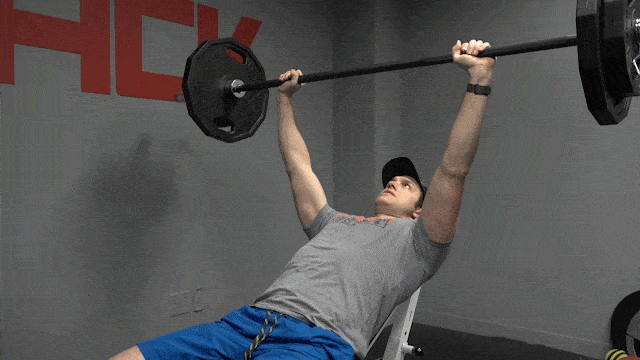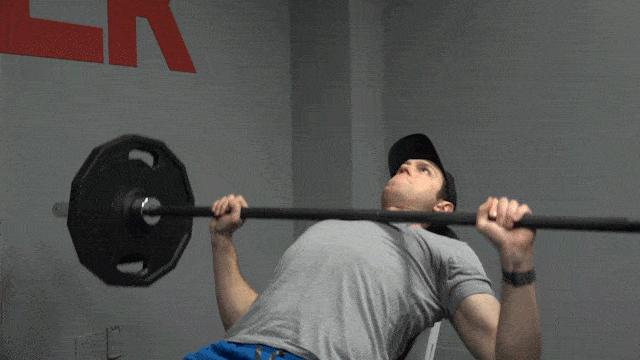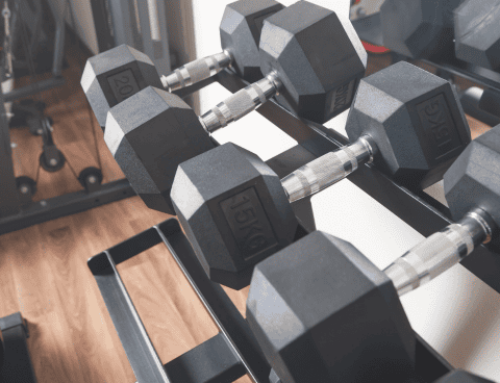Do The Incline Bench Press for a Stronger and Bigger Chest (With Form Tips and Variations)
The Incline Bench Press is a version of the traditional Bench Press in which the bench is positioned at about a 45-degree angle. The resulting inclined position targets your upper chest and the frontside of your shoulders more the the standard flat bench.
In this article, we’re going to cover everything you need to know about the Incline Bench Press to help you build a stronger and bigger upper body.
Incline Bench Press Form
To perform an Incline Bench Press, you need some type of incline bench. Here are your three options:
-
Many gyms have an incline bench station designed for the exercise. This is your best option.
-
If that’s not available, you’ll need to find an adjustable bench, raise it to about a 45-degree angle and place it in a power/squat rack.
-
Lastly, you can stack a minimum of four plates on the ground and set one end of a flat utility bench on it to get a slight incline.
For the second two options, make sure you test your setup with an empty barbell before adding weight to make sure the bench, height of the bar and safety pins (if you’re using them) are in the proper position.
Step 1: Lie on the incline bench and plant your feet on the floor with your butt about 6 inches above the seat. Now slide yourself down so your butt is on the seat without lifting your feet off the ground. Tighten your glutes and core. Learn more about this setup here.
Step 2: Grab the barbell with a grip slightly wider than shoulder width and hold onto it as tightly as you can. Unrack the bar and bring it directly over your shoulders with your arms straight. This is your starting position.
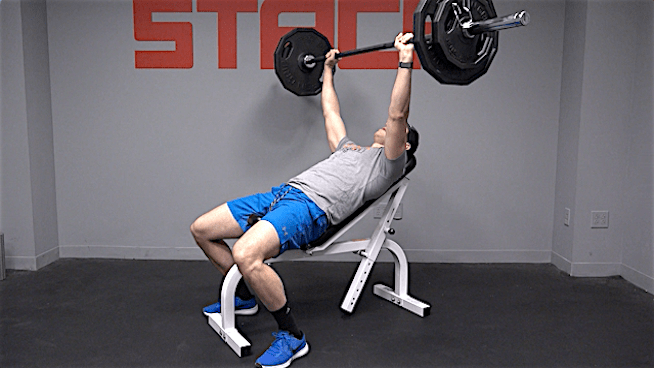
Step 3: Take a deep breath in and lower the bar with control to the upper part of your chest. Your elbows should be at about a 45-degree angle with your body.
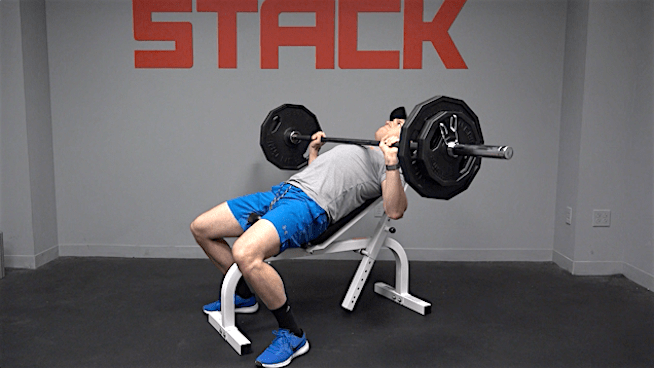
Step 4: Drive your feet into the ground and explosively press the bar up to return to the starting position.
Incline Bench Press Benefits
The Incline Bench Press is a compound upper-body exercise, meaning that multiple joints and muscles contribute to the movement. As a variation of the traditional flat Bench Press, it’s considered one of the best exercises to build a stronger and larger upper body.
The Incline Bench Press targets many of the same large upper-body muscles as the flat version. However, the angle of the press shifts the work to your upper chest and shoulders. Your shoulders continue to take on more of the work as the angle of the bench increases until the bench is vertical and it becomes a shoulder press.
The exercise can be performed with heavy weight to build max strength or with light weight to increase power or size depending on your goal. The inclined position is more difficult to press from, so you won’t be able to lift as much weight as you can on the flat bench. Many inexperienced lifters have a tendency to avoid the Incline Bench Press for this reason. However, training your weak points with the Incline Bench Press is one of the easiest ways to build a stronger flat Bench Press and a more well-rounded upper body.
Incline Bench Press Muscles Worked
The Incline Bench Press primarily works the clavicular head of the pectoralis major, or the upper portion of your chest. It also works the anterior deltoid (front portion of the shoulder) and the triceps (backside of your arm). When performed correctly, it should be a full-body movement using the small muscles in your shoulders, large muscles in your back, your core and even your glutes.
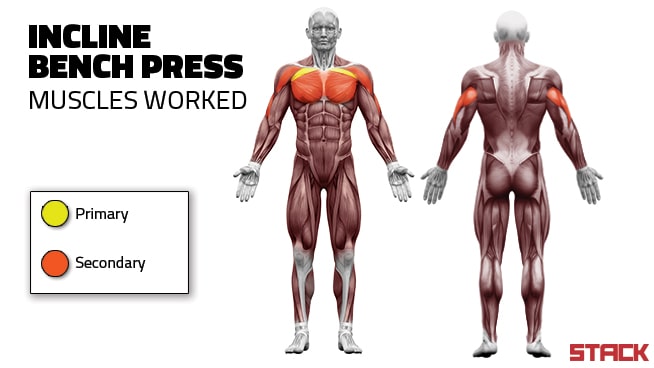
Incline Bench Press Mistakes
Lowering the bar toward your stomach
The bar path on the Bench Press goes from over your shoulders to just under your chest. However, this causes problems on the Incline Bench Press because of the angle of the lift. If you lower the bar toward your stomach, your upper arms will angle forward and the bar will want to fall forward out of your hands. My biceps were working hard to keep the bar from falling just demoing this mistake.
Flaring your arms
Many people experience shoulder pain on the Incline Press. Your first place to check is your elbow position. Do your arms flare out to the sides? If so, you’re putting your shoulders under a ton of stress and you’re not in an optimal position to produce strength. Instead, make sure your elbows are at approximately a 45-degree angle with your body—the exact angle depends on your anatomy.
Bouncing the bar off your chest
This is a no-no with every Bench Press variation. It’s OK to touch the bar to your chest, but don’t bounce it. That’s cheating and it’s dangerous—especially as you begin to lift heavy weight. If you have to bounce, then you probably need to use a lighter weight.
Fighting through shoulder pain
At no point should you fight through shoulder pain on this exercise. If you find that your shoulder hurts, first try correcting the mistakes above and make sure you’re setting your shoulders by pulling them down and back. If this doesn’t work, then lower the incline of the bench until you find a pressing position that’s comfortable.
There are other form mistakes that apply to every Bench Press variation, which you can learn more about here.
Incline Bench Press Alternatives and Variations
There are two variations of this exercise that will provide a slightly different challenge for your upper body.
Incline Dumbbell Press
The Incline Dumbbell Press is the most obvious variation. Doing this exercise with dumbbells helps improve shoulder stability and balances out strength between your left and right side. You won’t be able to lift as much weight, but it’s also a bit easier on your shoulders because your hands aren’t fixed on a straight barbell.
Single-Arm Landmine Press
This exercise is perfect for anyone who experiences shoulder pain on the exercise or who is an overhead athlete, such as a baseball player or tennis player. The exercise allows for your shoulder blades to move through a full range of motion for pain-free upper-body training.
Incline Hex Press
Squeeze moderately heavy weights together as hard as you can while pressing to get a massive chest pump and build your pecs.
Outside of those three exercises, variation largely depends on how you approach the exercise. Here are a few examples:
-
Change the tempo of the lift by lowering for 3-5 seconds and exploding up.
-
Use about 50 percent of your max and perform the reps as explosively as possible.
-
Add bands or chains for accommodating resistance.
Incline Bench Press Workouts
Here are a few workout options that feature Lateral Raises:
Incline Bench Press Strength Workout
-
Incline Bench Press – 5×4
Incline Bench Press Superset Workout
Perform the exercises back-to-back with no rest between the moves.
-
Incline Bench Press – 4×8
-
Pull-Ups – 4×8
Incline Bench Press Full-Body Circuit
Perform these exercises one after the other in a circuit without resting between them.
-
Incline Bench Press – 3×12
-
Dumbbell Reverse Lunge – 3×12 each leg
-
Band Pull-Aparts – 3×20
-
TRX/Swiss Ball Hamstring Curl – 3×12
RELATED:
RECOMMENDED FOR YOU
MOST POPULAR
Do The Incline Bench Press for a Stronger and Bigger Chest (With Form Tips and Variations)
The Incline Bench Press is a version of the traditional Bench Press in which the bench is positioned at about a 45-degree angle. The resulting inclined position targets your upper chest and the frontside of your shoulders more the the standard flat bench.
In this article, we’re going to cover everything you need to know about the Incline Bench Press to help you build a stronger and bigger upper body.
Incline Bench Press Form
To perform an Incline Bench Press, you need some type of incline bench. Here are your three options:
-
Many gyms have an incline bench station designed for the exercise. This is your best option.
-
If that’s not available, you’ll need to find an adjustable bench, raise it to about a 45-degree angle and place it in a power/squat rack.
-
Lastly, you can stack a minimum of four plates on the ground and set one end of a flat utility bench on it to get a slight incline.
For the second two options, make sure you test your setup with an empty barbell before adding weight to make sure the bench, height of the bar and safety pins (if you’re using them) are in the proper position.
Step 1: Lie on the incline bench and plant your feet on the floor with your butt about 6 inches above the seat. Now slide yourself down so your butt is on the seat without lifting your feet off the ground. Tighten your glutes and core. Learn more about this setup here.
Step 2: Grab the barbell with a grip slightly wider than shoulder width and hold onto it as tightly as you can. Unrack the bar and bring it directly over your shoulders with your arms straight. This is your starting position.

Step 3: Take a deep breath in and lower the bar with control to the upper part of your chest. Your elbows should be at about a 45-degree angle with your body.

Step 4: Drive your feet into the ground and explosively press the bar up to return to the starting position.
Incline Bench Press Benefits
The Incline Bench Press is a compound upper-body exercise, meaning that multiple joints and muscles contribute to the movement. As a variation of the traditional flat Bench Press, it’s considered one of the best exercises to build a stronger and larger upper body.
The Incline Bench Press targets many of the same large upper-body muscles as the flat version. However, the angle of the press shifts the work to your upper chest and shoulders. Your shoulders continue to take on more of the work as the angle of the bench increases until the bench is vertical and it becomes a shoulder press.
The exercise can be performed with heavy weight to build max strength or with light weight to increase power or size depending on your goal. The inclined position is more difficult to press from, so you won’t be able to lift as much weight as you can on the flat bench. Many inexperienced lifters have a tendency to avoid the Incline Bench Press for this reason. However, training your weak points with the Incline Bench Press is one of the easiest ways to build a stronger flat Bench Press and a more well-rounded upper body.
Incline Bench Press Muscles Worked
The Incline Bench Press primarily works the clavicular head of the pectoralis major, or the upper portion of your chest. It also works the anterior deltoid (front portion of the shoulder) and the triceps (backside of your arm). When performed correctly, it should be a full-body movement using the small muscles in your shoulders, large muscles in your back, your core and even your glutes.

Incline Bench Press Mistakes
Lowering the bar toward your stomach
The bar path on the Bench Press goes from over your shoulders to just under your chest. However, this causes problems on the Incline Bench Press because of the angle of the lift. If you lower the bar toward your stomach, your upper arms will angle forward and the bar will want to fall forward out of your hands. My biceps were working hard to keep the bar from falling just demoing this mistake.
Flaring your arms
Many people experience shoulder pain on the Incline Press. Your first place to check is your elbow position. Do your arms flare out to the sides? If so, you’re putting your shoulders under a ton of stress and you’re not in an optimal position to produce strength. Instead, make sure your elbows are at approximately a 45-degree angle with your body—the exact angle depends on your anatomy.
Bouncing the bar off your chest
This is a no-no with every Bench Press variation. It’s OK to touch the bar to your chest, but don’t bounce it. That’s cheating and it’s dangerous—especially as you begin to lift heavy weight. If you have to bounce, then you probably need to use a lighter weight.
Fighting through shoulder pain
At no point should you fight through shoulder pain on this exercise. If you find that your shoulder hurts, first try correcting the mistakes above and make sure you’re setting your shoulders by pulling them down and back. If this doesn’t work, then lower the incline of the bench until you find a pressing position that’s comfortable.
There are other form mistakes that apply to every Bench Press variation, which you can learn more about here.
Incline Bench Press Alternatives and Variations
There are two variations of this exercise that will provide a slightly different challenge for your upper body.
Incline Dumbbell Press
The Incline Dumbbell Press is the most obvious variation. Doing this exercise with dumbbells helps improve shoulder stability and balances out strength between your left and right side. You won’t be able to lift as much weight, but it’s also a bit easier on your shoulders because your hands aren’t fixed on a straight barbell.
Single-Arm Landmine Press
This exercise is perfect for anyone who experiences shoulder pain on the exercise or who is an overhead athlete, such as a baseball player or tennis player. The exercise allows for your shoulder blades to move through a full range of motion for pain-free upper-body training.
Incline Hex Press
Squeeze moderately heavy weights together as hard as you can while pressing to get a massive chest pump and build your pecs.
Outside of those three exercises, variation largely depends on how you approach the exercise. Here are a few examples:
-
Change the tempo of the lift by lowering for 3-5 seconds and exploding up.
-
Use about 50 percent of your max and perform the reps as explosively as possible.
-
Add bands or chains for accommodating resistance.
Incline Bench Press Workouts
Here are a few workout options that feature Lateral Raises:
Incline Bench Press Strength Workout
-
Incline Bench Press – 5×4
Incline Bench Press Superset Workout
Perform the exercises back-to-back with no rest between the moves.
-
Incline Bench Press – 4×8
-
Pull-Ups – 4×8
Incline Bench Press Full-Body Circuit
Perform these exercises one after the other in a circuit without resting between them.
-
Incline Bench Press – 3×12
-
Dumbbell Reverse Lunge – 3×12 each leg
-
Band Pull-Aparts – 3×20
-
TRX/Swiss Ball Hamstring Curl – 3×12
RELATED:


